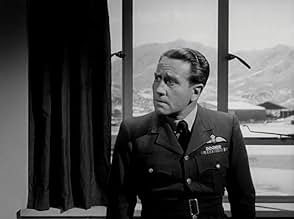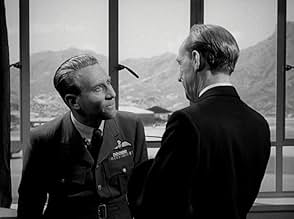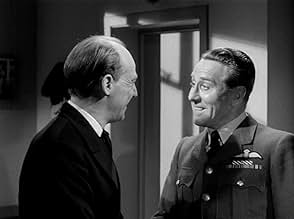VALUTAZIONE IMDb
7,0/10
1741
LA TUA VALUTAZIONE
Aggiungi una trama nella tua linguaOn a routine flight from Hong Kong to Japan, a British military transport aircraft's fate may or may not depend on a prophetic nightmare.On a routine flight from Hong Kong to Japan, a British military transport aircraft's fate may or may not depend on a prophetic nightmare.On a routine flight from Hong Kong to Japan, a British military transport aircraft's fate may or may not depend on a prophetic nightmare.
- Regia
- Sceneggiatura
- Star
- Nominato ai 4 BAFTA Award
- 4 candidature totali
Recensioni in evidenza
Thrilling airplane picture, and I can't think of many other airplane pictures to compare it to. Much better than 'The High And The Mighty"(1954), and "Five Came Back"(1939), and different than "Lost Horizon"(1937). "The Night My Number Came Up" is a compelling and suspenseful film about differing conceptions of fate as presented in a dream - the dream of someone who was not a passenger on the trip.
Briefly, a man at a party recounts a dream he had about an airline crash. He is talking to a group who are flying the next day, and some of the travelers are spooked. He then departs and the group discuss his dream; some dismiss it and others show great concern. But during the trip elements of the dream begin to fall into place.
The acting is first-rate throughout the cast. The main character is seldom-seen Alexander Knox as a passenger flying for the first time. Stalwart Michael Redgrave is his flying companion, and Denholm Elliot and Sheila Sim lend strong support. The picture has a claustrophobic feel as most of it takes place in the passenger cabin, perhaps increasing the feeling of impending doom. This may be in the picture's favor, as it adds to the tension and heightens the suspense, the way many movies attempt but few succeed the way this one does.
Briefly, a man at a party recounts a dream he had about an airline crash. He is talking to a group who are flying the next day, and some of the travelers are spooked. He then departs and the group discuss his dream; some dismiss it and others show great concern. But during the trip elements of the dream begin to fall into place.
The acting is first-rate throughout the cast. The main character is seldom-seen Alexander Knox as a passenger flying for the first time. Stalwart Michael Redgrave is his flying companion, and Denholm Elliot and Sheila Sim lend strong support. The picture has a claustrophobic feel as most of it takes place in the passenger cabin, perhaps increasing the feeling of impending doom. This may be in the picture's favor, as it adds to the tension and heightens the suspense, the way many movies attempt but few succeed the way this one does.
Although it may not have the same notoriety as some others produced by Ealing Studios under the benevolent leadership of Sir Michael Balcon this one is certainly one of the most intriguing. That it is based on a dramatic incident in the life of Air Marshall Sir Vincent Goddard who happened to be a spiritualist with an interest in paranormal activity, makes it even more intriguing.
Eight passengers and five crew members take off on a routine flight from Hong Kong to Japan. Unfortunately, the night before, three of the passengers have a dream recounted to them by a fellow dinner guest in which their plane crash lands. As the flight progresses the coincidences start piling up and what seemed a dream fast becomes a terrifying reality........
This film really works because of its excellent, tightly knit construction, literate script by R. C. Sheriff, ominous score by Malcolm Arnold and restrained direction by Leslie Norman.
Superlative Michael Redgrave plays the Air Marshall and heads a first rate cast whose understated performances give the film its dramatic intensity. This is probably the finest hour of actor Nigel Stock as the pilot who inadvertently hears about the dream and wishes he hadn't!
The ancients set great store by the prophetic power of dreams. Those who staunchly advocate 'free will' as opposed to 'predestination' will no doubt find the plot to be a load of tosh but 'there are more things in heaven and earth than are dreamt of in our philosophy'!
Eight passengers and five crew members take off on a routine flight from Hong Kong to Japan. Unfortunately, the night before, three of the passengers have a dream recounted to them by a fellow dinner guest in which their plane crash lands. As the flight progresses the coincidences start piling up and what seemed a dream fast becomes a terrifying reality........
This film really works because of its excellent, tightly knit construction, literate script by R. C. Sheriff, ominous score by Malcolm Arnold and restrained direction by Leslie Norman.
Superlative Michael Redgrave plays the Air Marshall and heads a first rate cast whose understated performances give the film its dramatic intensity. This is probably the finest hour of actor Nigel Stock as the pilot who inadvertently hears about the dream and wishes he hadn't!
The ancients set great store by the prophetic power of dreams. Those who staunchly advocate 'free will' as opposed to 'predestination' will no doubt find the plot to be a load of tosh but 'there are more things in heaven and earth than are dreamt of in our philosophy'!
I saw this movie in 1955, when I was 35 and not so long after my time in the Air Force in WWII, so the RAF flight in the Dakota (same as our USAF C47 and the civilian DC3) resonated for me. But it was really the extraordinary level of suspense that made it so memorable. It starts with a dream of a Dakota lost in a storm and crashing onto a rocky beach. Crucial is the exact number on board. As the real trip progresses in stages, passengers get on and off. Just as it seems the fatal number has been circumvented, something happens to re-institute it. The way this was done was so believable and artfully handled. I particularly remember an episode with someone pointing out that telling the pilot the dream is not such a good idea; after all, he needs his skills to fly the plane safely, and if he takes the dream seriously and it makes him nervous...I have used this idea the rest of my life when directing hundreds of people. It touches on a profound bit of philosophy: when is deception justified? A great movie: if you get the chance, don't miss it.
From the title, I was expecting a gambling yarn along the lines of "The Man Who Broke The Bank At Monte Carlo", but instead I got a very British suspenser directed by the late, venerable British film critic Barry Norman's old dad Leslie. It's got a good cast too of top British talent, including Michael Redgrave, Sylvia Sim and a young Denholm Elliott and just-as-young Michael Hordern, who actually looks pretty much like his later, much older self.
The story has the hallmark of the much later Hollywood "Final Destination" series as Hordern's non-traveling R.A.F. commander reveals to Alexander Knox's ambitious Far Eastern diplomat a weird dream he had the night before of a particular group of people including Knox, on a particular flight flying into a terrible life-threatening storm over Japan. Knox has never flown and dreads the thought when he's corralled into the aerial mission but is comforted when the personnel details Hordern provided don't match up to the expected passengers, but that all changes when the ducks all line up in a row overnight as the aeroplane type and planned passenger list eerily changes to match the related dream.
That list, which prominently includes Redgrave's senior Air Marshall and his P.A. Elliott, a former pilot now reduced to ground duties after suffering a nervous breakdown from his war-time pilot duties, is expanded to include initially two late-returning soldiers, then a young woman, Sim, a lordly government V.I.P. Ralph Truman and to complete the fateful eight (passengers) a spivvy, gobby businessman and his elderly male secretary who, added to the crew of five, headed by pilot Nigel Stock, take the total personage on board to unlucky 13. As the story of the dream leaks out, mostly from the terrified Knox, the passengers start to fear the worst, especially when the plane flies off course and straight into an almighty storm...
I found the first hour of the movie rather slow-moving, with stereotypical character types demonstrating the familiar British traits of reserve and stiff-upper-lip. The little model plane used for the exterior shots is hardly convincing either as it takes a supposed battering and just how or why Hordern dreams his dream is left unexplained. I also kept expecting some sort of emotional outburst from Elliott's obviously damaged character while Sim's character and that of the two working-class squaddies seem just like so much padding.
However, the tension ratchets up nicely as the film hurtles towards its destiny, there's a pretty effective crash scene and a neat pay-off joke as Hordern's character reveals the outcome of his latest sleep to his next acquaintance on the ground.
Overall, this was a good under-the-radar movie to get on board and if not an absolute high-flier, certainly made for an interesting and entertaining journey.
The story has the hallmark of the much later Hollywood "Final Destination" series as Hordern's non-traveling R.A.F. commander reveals to Alexander Knox's ambitious Far Eastern diplomat a weird dream he had the night before of a particular group of people including Knox, on a particular flight flying into a terrible life-threatening storm over Japan. Knox has never flown and dreads the thought when he's corralled into the aerial mission but is comforted when the personnel details Hordern provided don't match up to the expected passengers, but that all changes when the ducks all line up in a row overnight as the aeroplane type and planned passenger list eerily changes to match the related dream.
That list, which prominently includes Redgrave's senior Air Marshall and his P.A. Elliott, a former pilot now reduced to ground duties after suffering a nervous breakdown from his war-time pilot duties, is expanded to include initially two late-returning soldiers, then a young woman, Sim, a lordly government V.I.P. Ralph Truman and to complete the fateful eight (passengers) a spivvy, gobby businessman and his elderly male secretary who, added to the crew of five, headed by pilot Nigel Stock, take the total personage on board to unlucky 13. As the story of the dream leaks out, mostly from the terrified Knox, the passengers start to fear the worst, especially when the plane flies off course and straight into an almighty storm...
I found the first hour of the movie rather slow-moving, with stereotypical character types demonstrating the familiar British traits of reserve and stiff-upper-lip. The little model plane used for the exterior shots is hardly convincing either as it takes a supposed battering and just how or why Hordern dreams his dream is left unexplained. I also kept expecting some sort of emotional outburst from Elliott's obviously damaged character while Sim's character and that of the two working-class squaddies seem just like so much padding.
However, the tension ratchets up nicely as the film hurtles towards its destiny, there's a pretty effective crash scene and a neat pay-off joke as Hordern's character reveals the outcome of his latest sleep to his next acquaintance on the ground.
Overall, this was a good under-the-radar movie to get on board and if not an absolute high-flier, certainly made for an interesting and entertaining journey.
A 1950's movie from the British studios. The basis of the plot is relatively simple, however, the outcome is never really obvious. It may not keep you on the edge of your seat biting your nails but it does keep you guessing till the end. A few lines at the very end by two of the lesser characters adds a finish not really seen till the advent of the "Twighlight Zone" TV series. Shakespeare used the use of dreams in many of his plays. This created his characters thoughts and actions. It seems that this method is used in this film for the same reason and pushes the movie along. The movie has a classic British cast such as Michael Redgrave and Denholm Elliott. Whilst the other actors names might not be easily recalled. They are readily identifiable and seen in numerous British movies of the 1940's and 50's. There is a small amount comic relief in the movie through the minor characters of two British soldiers. Australian viewers may even find hard to recognize one of them as being the local classic actor Bill Kerr. It is an old fashioned movie worthy of a watch.
Lo sapevi?
- QuizThe script is based on a personal account by Sir Victor Goddard.
- BlooperClearly, different cockpits were used in different shots. The altimeter keeps switching back and forth between two quite different designs and layouts.
- Citazioni
Mary Campbell: Anyone with sense has doubts.
- Curiosità sui creditiOpening credits, prior to film title: There were 8 passengers 5 crew
I più visti
Accedi per valutare e creare un elenco di titoli salvati per ottenere consigli personalizzati
- How long is The Night My Number Came Up?Powered by Alexa
Dettagli
- Data di uscita
- Paese di origine
- Lingua
- Celebre anche come
- The Night My Number Came Up
- Luoghi delle riprese
- Ealing Studios, Ealing, Londra, Inghilterra, Regno Unito(studio: made at)
- Aziende produttrici
- Vedi altri crediti dell’azienda su IMDbPro
- Tempo di esecuzione
- 1h 34min(94 min)
- Colore
- Proporzioni
- 1.33 : 1
- 1.85 : 1(originally intended theatrical ratio)
Contribuisci a questa pagina
Suggerisci una modifica o aggiungi i contenuti mancanti






















